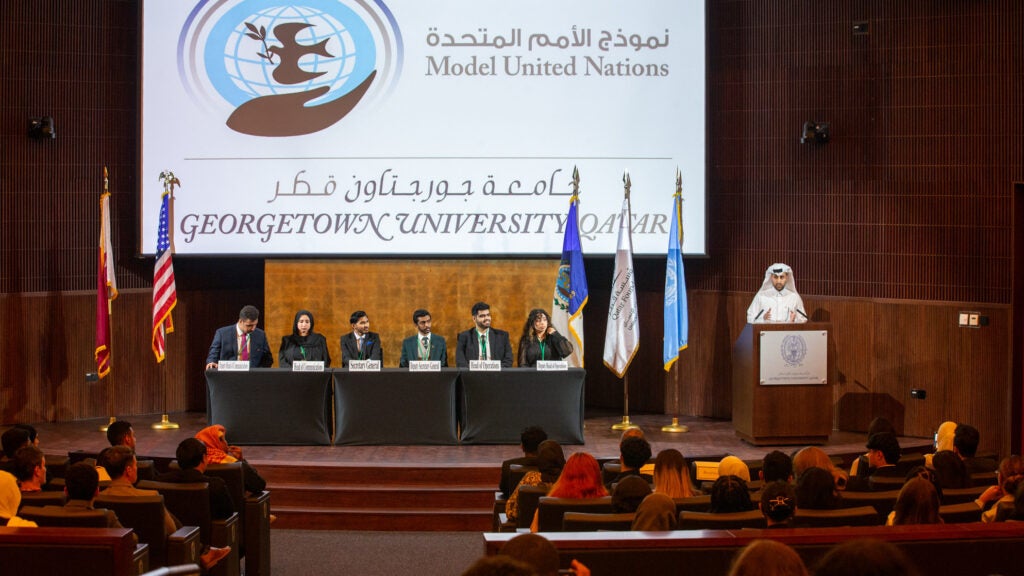Debate: The Art of Arguing & Listening
Hello there!
How’s the summer break treating you? This is my first summer in Doha, and while it’s hot, I am really enjoying it.
For this piece, I want to discuss the art of debate, argumentation, and public speaking — something we heavily focus on at GU-Q. In today’s fast-paced world, one needs to effectively communicate and express themselves, even in the face of diverging opinions. We know how quickly a video, an idea, or an argument can travel, but that doesn’t mean we can’t have healthy discussions even when our perspectives don’t align. Over my past two years at Georgetown, I have had to master public speaking and engage in debates with my peers and professors. Hence, my goal with this blog is to share with you how Georgetown has helped me grow as a communicator and confidently assert myself in the world.
1. Class Debates
Georgetown courses, especially political science classes, have offered me a unique platform to refine my communication skills. Often I am required to engage with sensitive political topics, actively participate in class debates, and defend my viewpoints on certain subjects. In one of my classes, I had a debate with my professor about the role of religion in helping us understand historical events. My professor is an expert on religion and history, way more than I am, but in their class I was able to express my thoughts on the topic and to present a different perspective drawn from my knowledge and life experiences. What I appreciated most about this class debate was that my professor encouraged me to disagree with them! While I don’t make a habit of debating my professors, this experience challenged me to think critically and to be comfortable with different viewpoints. I left it feeling confident and more intentional about my communication style.
2. (Dis)agreeing
My two years at Georgetown have provided me with a profound understanding of the significance of cultural awareness. As a student at an international university, I have had the privilege of interacting with peers from various backgrounds, which has been an immensely enlightening experience. Being part of a student body with over 70 nationalities has exposed me to a mosaic of cultural values and norms. In such a space, disagreements are inevitable. One of the most memorable conversations I had at Georgetown was about individuality vs. community. As an African, I firmly believe that a person’s identity is shaped by their community, whereas some of my Euro-American friends held the view that an individual shapes the group’s identity. Although we did not end up agreeing, we did acknowledge that this conversation is important and one needs a degree of sensitivity to engage in it. My experience in classes such as Political and Social Thought made me realize that many contemporary debates such as this one are part of a broader discourse between thinkers throughout history. Since then, I have learned the art of respectful disagreement and approaching tough discussions with cultural awareness and empathy. Being a student at a School of Foreign Service such as ours means finding common ground even when you have diverse viewpoints.

3. Leadership through Listening
Before coming to Georgetown, I always thought that a leader is the loudest person in the room. However, my Georgetown journey over the last semester has taught me otherwise. Over the spring break, I had the opportunity to be the chairperson of the biggest committee at Georgetown’s Model United Nations, the Human Rights Council (HRC). I remember entering the committee room and seeing the faces of over 80 delegates seated like diplomats, preparing themselves to engage in formal debate and thinking to myself: how am I supposed to lead such a big committee? Moderating sessions required me to create a conducive environment for the delegates to engage freely with each other. In order to accomplish this, I had to actively listen to delegates and give them the space to express themselves without fear of judgment. As they engaged with each other, I was able to witness their passion for politics come to life and how their public speaking skills blossomed over a period of 3 days. This experience really taught me that an effective communicator prioritizes listening just as much as speaking. By genuinely learning to listen to others, I was able to gain a new understanding of leadership.
*
I am eternally grateful for the communication skills that I have harnessed through my classes and my extracurricular activities. These skills will transcend the classroom walls and become essential tools in my personal and professional life. I am excited to see how I will grow as a communicator and a collaborator over the next two years. Who knows, maybe I will be having a debate with one of you in the future at Georgetown.